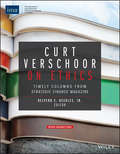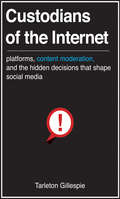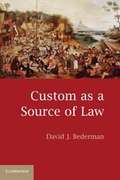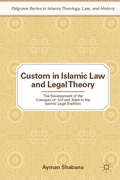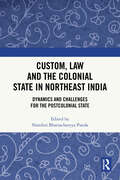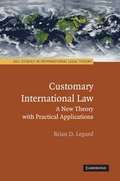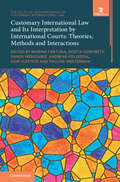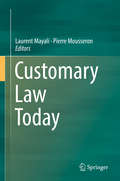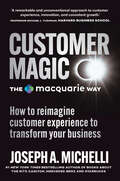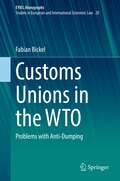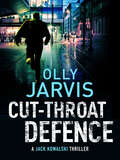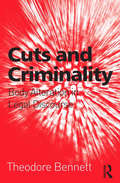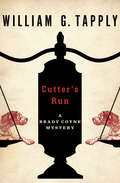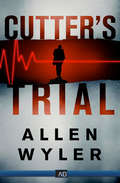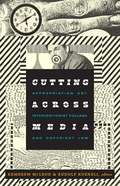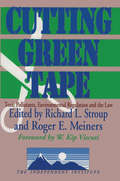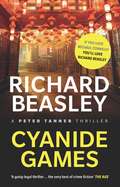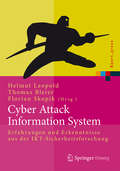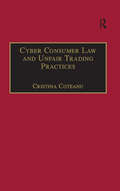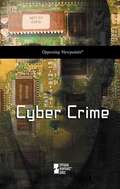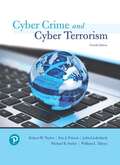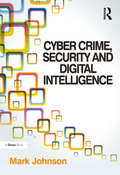- Table View
- List View
Curt Verschoor on Ethics: Timely Columns from Strategic Finance Magazine
by Curtis C. VerschoorCurt Verschoor On Ethics is a compilation of the best business ethics columns that will continue for years forward to be of lasting educational value. In a company setting, the columns can function as the basis for discussion on proper business ethics. In academia, the columns can serve as assigned readings over significant ethics events and issues. Some topics that are covered in the columns include: Value of a Strong Ethical Culture Studies of Ethical and Unethical Culture Public and Management Accounting Ethics Ethics of Executive Compensation International Ethics Standards Fraud Case Studies Small Organization Fraud Studies Regulation and Enforcement Whistleblowing Sustainability and Integrated Reporting Tax Avoidance Issues Students
Custodians of the Internet: Platforms, Content Moderation, and the Hidden Decisions That Shape Social Media
by Tarleton GillespieA revealing and gripping investigation into how social media platforms police what we post online—and the large societal impact of these decisions Most users want their Twitter feed, Facebook page, and YouTube comments to be free of harassment and porn. Whether faced with “fake news” or livestreamed violence, “content moderators”—who censor or promote user†‘posted content—have never been more important. This is especially true when the tools that social media platforms use to curb trolling, ban hate speech, and censor pornography can also silence the speech you need to hear. In this revealing and nuanced exploration, award†‘winning sociologist and cultural observer Tarleton Gillespie provides an overview of current social media practices and explains the underlying rationales for how, when, and why these policies are enforced. In doing so, Gillespie highlights that content moderation receives too little public scrutiny even as it is shapes social norms and creates consequences for public discourse, cultural production, and the fabric of society. Based on interviews with content moderators, creators, and consumers, this accessible, timely book is a must†‘read for anyone who’s ever clicked “like” or “retweet.”
Custom and Conflict in Africa
by Max GluckmanA distinguished British anthropologist, Max Gluckman (1911-1975) pioneered the study of traditional African legal systems. His research stressed social conflict and mechanisms for conflict resolution while studying urbanization and social change in colonial Africa.
Custom as a Source of Law
by David J. BedermanA central puzzle in jurisprudence has been the role of custom in law. Custom is simply the practices and usages of distinctive communities. But are such customs legally binding? Can custom be law, even before it is recognized by authoritative legislation or precedent? And, assuming that custom is a source of law, what are its constituent elements? Is proof of a consistent and long-standing practice sufficient, or must there be an extra ingredient - that the usage is pursued out of a sense of legal obligation, or, at least, that the custom is reasonable and efficacious? And, most tantalizing of all, is custom a source of law that we should embrace in modern, sophisticated legal systems, or is the notion of law from below outdated, or even dangerous, today? This volume answers these questions through a rigorous multidisciplinary, historical, and comparative approach, offering a fresh perspective on custom's enduring place in both domestic and international law.
Custom in Islamic Law and Legal Theory: The Development of the Concepts of ?Urf and ??dah in the Islamic Legal Tradition (Palgrave Series in Islamic Theology, Law, and History)
by Ayman ShabanaThis book explores the relationship between custom and Islamic law and seeks to uncover the role of custom in the construction of legal rulings. On a deeper level, however, it deals with the perennial problem of change and continuity in the Islamic legal tradition (or any tradition for that matter).
Custom, Law and the Colonial State in Northeast India: Dynamics and Challenges for the Postcolonial State
by Nandini Bhattacharyya PandaThis volume presents a multidimensional analysis of the current operational law – both constitutional and customary – in Northeast India. It looks at how colonialism redesigned and redefined extant customary practices, leaving a permanent legacy on the legal governance and societal structure of the post-colonial Indian state.The book interrogates “law” through a broad spectrum of issues including gender, partition, the legacy of colonial structures, and religion as a form of resistance against land grabbing and censorship. It delineates a distinct historical process of the evolution of law and custom and focuses on the intimate links between law and the dynamics of state, ethnicity, and governance.As a unique contribution, the book offers new insights into how and why the continuity of colonial law within a democratic framework perpetuates deep-rooted problems in governance and the psyche of the people. It will be indispensable for students and researchers of history, law, anthropology, legal anthropology, sociology, Indian politics, and South Asian studies.
Customary International Law
by Brian D. LepardCustomary international law, although long recognized as a primary source of international law, remains replete with enigmas, both conceptual and practical. These include how to determine the existence of opinio juris, the function of the state practice requirement, the definition of jus cogens customary norms, and the relationship between customary international law and ethics. In part because of these enigmas, the subject has generated a wide-ranging literature. However, no recent book-length work has attempted to articulate a comprehensive theory of customary international law that can effectively resolve these questions. This book sets out to accomplish this goal. Its approach is unique in a number of ways. For example, it is multidisciplinary and draws insights from fields such as legal theory, philosophy, political science, and game theory. In addition, it is anchored in a sophisticated ethical framework and explores at length the interconnections between customary international law and ethics.
Customary International Law and Its Interpretation by International Courts: Theories, Methods and Interactions (The Rules of Interpretation of Customary International Law)
by Geir Ulfstein Andreas Føllesdal Pauline Westerman Panos Merkouris Marina Fortuna Kostia GorobetsIt is notorious that international courts and tribunals have greatly contributed to the development of customary international law (CIL) by, for instance, articulating the constituent elements of custom and clarifying the conditions required for its modification. This volume demonstrates that they have also been actively engaged in the interpretation of CIL. In elucidating CIL interpretation before and by international courts and tribunals, the volume chooses three focal points: theory, method and normative interactions. Viewing CIL and its interpretation from these vantage points leads to a more complete picture of the role and function of CIL interpretation in international courts. The volume encourages readers to question orthodox theories on CIL and its interpretation, to look anew at what has long been labelled mere identification of custom, and to take a systemic approach to CIL, which, even in the process of interpretation, remains unwaveringly connected to treaties and general principles of law.
Customary International Law in Times of Fundamental Change
by Michael P. ScharfThis is the first book to explore the concept of "Grotian Moments. " Named for Hugo Grotius, whose masterpiece De Jure Belli ac Pacis helped marshal in the modern system of international law, Grotian Moments are transformative developments that generate the unique conditions for accelerated formation of customary international law. In periods of fundamental change, whether by technological advances, the commission of new forms of crimes against humanity, or the development of new means of warfare or terrorism, customary international law may form much more rapidly and with less state practice than is normally the case to keep up with the pace of developments. The book examines the historic underpinnings of the Grotian Moment concept, provides a theoretical framework for testing its existence and application, and analyzes six case studies of potential Grotian Moments: Nuremberg, the continental shelf, space law, the Yugoslavia Tribunal's Tadic decision, the 1999 NATO intervention in Serbia, and the 9/11 terrorist attacks.
Customary Law Today
by Laurent Mayali Pierre MousseronThis book addresses current practices in customary law. It includes contributions by scholars from various legal systems (the USA, France, Israel, Canada etc.), who examine the current impacts of customary law on various aspects of private law, constitutional law, business law, international law and criminal law. In addition, the book expands the traditional concept of the rule of law, and argues that lawyers should not narrowly focus on statutory law, but should instead pay more attention to the impact of practices on “real legal life.” It states that the observation of practices calls for a stronger focus on usage, customs and traditions in our legal systems – the idea being not to replace statutory law, but to complement it with customary observations.
Customer Magic – The Macquarie Way: How to Reimagine Customer Experience to Transform Your Business
by Joseph A. MichelliIt takes a special kind of magic for a challenger brand to achieve seemingly impossible customer-centric results. It' s that magic that makes Australian telecommunications company Macquarie Technology world leaders in award-winning customer experience. Joseph A. Michelli – the bestselling author of books about brands renowned for their stellar service and outstanding growth, such as The Ritz-Carlton, Mercedes-Benz and Starbucks – was so impressed by Macquarie' s ability to deliver transformative customer experiences that he felt compelled to write this book. Customer Magic is a practical, easy-to-read guide that, consistent with Macquarie' s commitment to delivering customer value, shares transferrable knowledge on how to identify and solve customer pain points; craft a compelling unique value proposition; attract, select, grow and retain customer service talent and subject matter expertise; set, measure, track and incentivise mission-critical business goals and customer-driven growth; innovate solutions that meet your customers' stated and unstated needs; and maintain a growth mindset and leave a legacy of success.
Customs Unions in the WTO: Problems with Anti-Dumping (European Yearbook of International Economic Law #20)
by Fabian BickelHow the WTO deals with regional trade agreements (RTAs) is conceptually and practically one of the most important questions in international trade law. This book clarifies that relationship focussing on one form of regional integration – customs unions – and one form of trade measures – anti-dumping measures. This book answers the question how anti-dumping measures and legislation change if a state is in a customs union as well. In doing so, this book provides a new reasoning why anti-dumping measures are modified in customs unions, as well as a comprehensive overview of how this has happened, a legal analysis on the legality of these changes, and an answer to the question how the different institutional settings have impacted questions of responsibility and attribution. Going beyond this, this book also considers the specific problems that arise in cases of economic integration and disintegration, and finally, the impact forming a customs union has on third parties that may impose anti-dumping measures on states that are members of a customs union.
Custom’s Future
by Curtis A. BradleyAlthough customary international law has long been an important source of rights and obligations in international relations, there has been extensive debate in recent years about whether this body of law is equipped to address complex modern problems such as climate change, international terrorism, and global financial instability. In addition, there is growing uncertainty about how, precisely, international and domestic courts should identify rules of customary international law. Custom's Future seeks to address this uncertainty by providing a better understanding of how customary international law has developed over time, the way in which it is applied in practice, and the challenges that it faces going forward. Reflecting an interdisciplinary mix of historical, empirical, economic, philosophical, and doctrinal analysis, and containing chapters by leading international law experts, it will be of use to lawyers, judges, and researchers alike.
Cut-Throat Defence (A Jack Kowalski Thriller)
by Olly JarvisIn this &“tautly-written&” legal thriller, a British defense lawyer&’s search for his missing client draws him into Manchester&’s criminal underworld (Manchester Evening News). As the son of Polish immigrants, Jack Kowalski knows how it feels to be the underdog. But now, as a successful young barrister, he&’s working on the biggest drugs trials in British history. Determined to prove himself and fight for his clients, he argues a savage &“cut-throat: defense—a risky tactic where the defendants blame each other. But when his defendant suddenly disappears, Jack and solicitor Lara Panassai struggle to hold the case together. In search of their client, and desperate for new evidence, they must comb through Manchester&’s notoriously dangerous underworld. And as each turn takes the case into darker territory, Jack must decide who—if anyone—can be trusted.
Cuts and Criminality: Body Alteration in Legal Discourse
by Theodore BennettThis book investigates how and why the criminal law differentiates between different types of body alterations, with particular reference to how they are conceptualised within legal discourse. By drawing connections between types of body alteration that have traditionally been considered separately and discretely, the book allows analytical conclusions to be made about the law’s treatment of the general category of ’body alteration’ rather than merely about specific types of body alteration. Taking legal discourse as its analytical focus, the author critically examines a number of case studies to determine the techniques and processes by which some body alterations are discursively constructed as legitimate and legally approved, and by which other body alterations are discursively constructed as illegitimate and legally sanctioned. Specifically, the body alterations that are addressed include sadomasochistic injuries; female genital modification and male circumcision; cosmetic surgery, body modification and healthy limb amputation; and sex reassignment surgery and genital ’normalisation’ surgery. International in scope, the discursive analysis in the book will be of interest to academics and researchers working in the areas of socio-legal and cultural studies.
Cutter's Run (The Brady Coyne Mysteries #15)
by William G. TapplyWhile fishing in Maine, the Boston lawyer runs afoul of a racist conspiracy in this mystery thriller from the &“smooth and sophisticated&” author (The New York Times). Brady Coyne is far from Boston when he stumbles across his latest case. He&’s in the beautiful Maine countryside, fishing and spending time with his beloved Alexandria Shaw, when he meets Charlotte Gillespie on the side of the road. A beautiful middle-aged black woman, she&’s walking into town with her dog in her arms. The puppy is near dead, having been poisoned—probably by the same person who spray-painted the swastika on Charlotte&’s property. After giving her a lift into town, Brady tries to find a way to help, but before Charlotte can explain her problems, she disappears. In unfamiliar territory, with a vanished client and rumors swirling around him, Brady tries to come to grips with the shadowy presence that has rotted this pleasant little town from the inside out. There are dangerous men in these woods—and anyone who would poison a puppy won&’t hesitate to kill a man.
Cutter's Trial
by Allen WylerFrom the author of Deadly Odds: Politics and medicine collide in the courtroom—as a doctor stands trial for his role in a patient’s assisted suicide. With a tumor in her brain, Meredith Costello knew too well what kind of debilitating agony she faced. And so did her physician. Neurologist Alex Cutter had watched a myriad of patients die lingering deaths from the same affliction: their brains slowly deteriorated while their minds remained intact and fully aware. So when Costello begged Cutter to help her take back control—if not of her life, then at least of her death—he did what he thought was right. Now he’s being called a murderer. With his freedom and reputation on the line, Cutter must decide whether to give in to the pressures of a deeply religious and conservative Southern community—or risk everything by standing trial to fight for what he believes. This is a suspenseful medical and legal drama from an author who, in the words of New York Times–bestselling author Joseph Finder, “takes us behind the scenes to show us things the medical establishment doesn’t want us to see.”
Cutting Across Media: Appropriation Art, Interventionist Collage, and Copyright Law
by Kembrew Mcleod Rudolf KuenzliIn this collection of essays, leading academics, critics, and artists historicize collage and appropriation tactics that cut across diverse media and genres. They take up issues of appropriation in the popular and the avant-garde, in altered billboards and the work of the renowned painter Chris Ofili, in hip-hop and the compositions of Bla Bartk and Zoltn Kodly, and in audio mash-ups, remixed news broadcasts, pranks, culture jamming, and numerous other cultural forms. The borrowing practices that they consider often run afoul of intellectual property regimes, and many of the contributors address the effects of copyright and trademark law on creativity. Among the contributors are the novelist and essayist Jonathan Lethem, the poet and cultural critic Joshua Clover, the filmmaker Craig Baldwin, the hip-hop historian Jeff Chang, the 'zine-maker and sound collage artist Lloyd Dunn, and Negativland, the infamous collective that was sued in 1991 for sampling U2 in a satirical sound collage. Cutting Across Media is both a serious examination of collage and appropriation practices and a celebration of their transformative political and cultural possibilities. Contributors Craig Baldwin David Banash Marcus Boon Jeff Chang Joshua Clover Lorraine Morales Cox Lloyd Dunn Philo T. Farnsworth Pierre Joris Douglas Kahn Rudolf Kuenzli Rob Latham Jonathan Lethem Carrie McLaren Kembrew McLeod Negativland Davis Schneiderman David Tetzlaff Gbor Vlyi Warner Special Products Eva Hemmungs Wirtn
Cutting Green Tape: Pollutants, Environmental Regulation and the Law
by Richard L. Stroup Roger E. MeinersHundreds of hazardous waste sites are on the Superfund National Priority List in the United States, and thousands more could become eligible. The Superfund has spent or ordered the spending of billions of dollars, with little apparent impact on human health risks. While public perception of the real or imagined hazardous nature of consumer and industrial substances has resulted in widespread attention to the issue, lawsuits have proliferated with liability aimed at "deep pockets" instead of individual agents who may be responsible. Contributors to Cutting Green Tape carefully examine the existence and severity of the toxic harms and liability problem, the erosion of a clear tort legal system to settle disputes, and whether a clearly defined system of property rights could be developed to reduce the dangers from toxic substances.Cutting Green Tape rethinks the nature and impact of today's environmental bureaucracy. Rather than continue unworkable, cumbersome, and often contradictory regulations, Cutting Green Tape prescribes a clearer tort legal system to settle disputes and demonstrates that clearly defined environmental property rights would reduce the threat of toxic substances. Among the many topics addressed are: air toxins policy; pollution, damages, and tort law; risk assessment, insurance, and public information; protecting groundwater; regulation of carcinogens; contracting for health and safety; and toxin torts by government.The book converges on a central theme: when common law remedies, with their burden of proof and standards of evidence, are replaced by the legislatively mandated regulatory regimes described, a problem emerges. The bureaucratic "tunnel vision" described by Justice Stephen Breyer, tends to take over. The police powers of the state are given to bureaucratic decision makers who are limited only by the blunt instrument of political influence, rather than by the need to show harm or wrongdoing in an unbiased court (as the police are), or by a budget on expenditures set by the Congress (as most bureaus are). The excesses described in the chapters thus result not from incompetence in the bureaus, but from the expansive powers granted to decision makers who are tightly focused on the narrow mission they see before them.
Cyanide Games: A Peter Tanner Thriller
by Richard BeasleyHow far would you go to save a friend? A tough, gritty legal thriller from the bestselling author of Hell Has Harbour Views When Melissa Cheung's husband is arrested in China for corruption, her first call is to Peter Tanner. As a criminal defence barrister, Tanner often crosses paths with some of the most evil but wealthy members of the nation's underbelly. Melissa's phone call takes Tanner away from drug dealers and crooked property developers into the highest end of corporate corruption - mining companies trying to cover up environmental disasters and families at the top of the rich list who think they're above the law. As he pursues those who had Cheung incarcerated, Tanner unearths cover-up after cover-up, putting his life and those of others in danger as he tries to bring the perpetrators to justice.
Cyber Attack Information System: Erfahrungen und Erkenntnisse aus der IKT-Sicherheitsforschung (Xpert.press)
by Florian Skopik Helmut Leopold Thomas BleierIn den letzten Jahren hat sich das Internet schnell zu einem massiven wirtschaftlichen Betätigungsfeld entwickelt, leider auch für illegale Unternehmungen. Das Ausnutzen von Schwachstellen in IKT-Systemen ist inzwischen ein profitables Geschäftsmodell. Das staatlich geförderte Forschungsprojekt CAIS beschäftigte sich deshalb mit der Implementierung eines Cyber Attack Information Systems auf nationaler Ebene mit dem Ziel, die Widerstandsfähigkeit der heutigen vernetzten Systeme zu stärken und ihre Verfügbarkeit und Vertrauenswürdigkeit zu erhöhen. Hauptziele dieses Projektes waren die Identifizierung der künftigen Cyber-Risiken und -Bedrohungen, die Untersuchung neuartiger Techniken zur Anomalieerkennung, die Entwicklung modularer Infrastrukturmodelle und agentenbasierter Simulationen zur Risiko- und Bedrohungsanalyse, und schließlich die Analyse und mögliche Umsetzung eines nationalen Cyber Attack Information Systems.
Cyber Consumer Law and Unfair Trading Practices (Markets and the Law)
by Cristina CoteanuOf great interest to practitioners, policymakers and academics - as well as to consumers and traders in general - this timely work addresses all important legal and practical issues that arise in connection with online trading. This important work outlines the existing legislation and legal jurisprudence in the EU and the US and exposes the potential for unfair commercial practices to arise from online contracts, electronic agents, disclosure of information, online advertising and online dispute resolution in cross-border transactions. The continuing prevalence of unfair commercial practices will ensure this book remains in great demand.
Cyber Crime and Cyber Terrorism
by Michael Saylor Robert Taylor John Liederbach Eric Fritsch William TafoyaThis book is a comprehensive introduction to the acts and theories of cyber crime, cyber terrorism, and information warfare. Assuming no prior knowledge of technology, the authors cover the types of crimes and terrorist acts committed using computer technology, theories addressing hackers and other digital criminals, and investigative, research, and legal strategies targeting these acts. Like no other on the market, the text bridges the gap between criminal justice knowledge and the technical issues that arise during investigations of cyber crime. The 4th edition adds material on new technologies and trends, plus updated review questions and activities.
Cyber Crime, Security and Digital Intelligence: Vulnerabilities Risks Threat Actors And Controls In The Information Age
by Mark JohnsonToday's digital economy is uniquely dependent on the Internet, yet few users or decision makers have more than a rudimentary understanding of the myriad of online risks that threaten us. Cyber crime is one of the main threats to the integrity and availability of data and systems. From insiders to complex external attacks and industrial worms, modern business faces unprecedented challenges; and while cyber security and digital intelligence are the necessary responses to this challenge, they are understood by only a tiny minority. In his second book on high-tech risks, Mark Johnson goes far beyond enumerating past cases and summarising legal or regulatory requirements. He describes in plain, non-technical language how cyber crime has evolved and the nature of the very latest threats. He confronts issues that are not addressed by codified rules and practice guidelines, supporting this with over 30 valuable illustrations and tables. Written for the non-technical layman and the high tech risk manager alike, the book also explores countermeasures, penetration testing, best practice principles, cyber conflict and future challenges. A discussion of Web 2.0 risks delves into the very real questions facing policy makers, along with the pros and cons of open source data. In a chapter on Digital Intelligence readers are provided with an exhaustive guide to practical, effective and ethical online investigations. Cyber Crime, Security and Digital Intelligence is an important work of great relevance in today's interconnected world and one that nobody with an interest in either risk or technology should be without.
